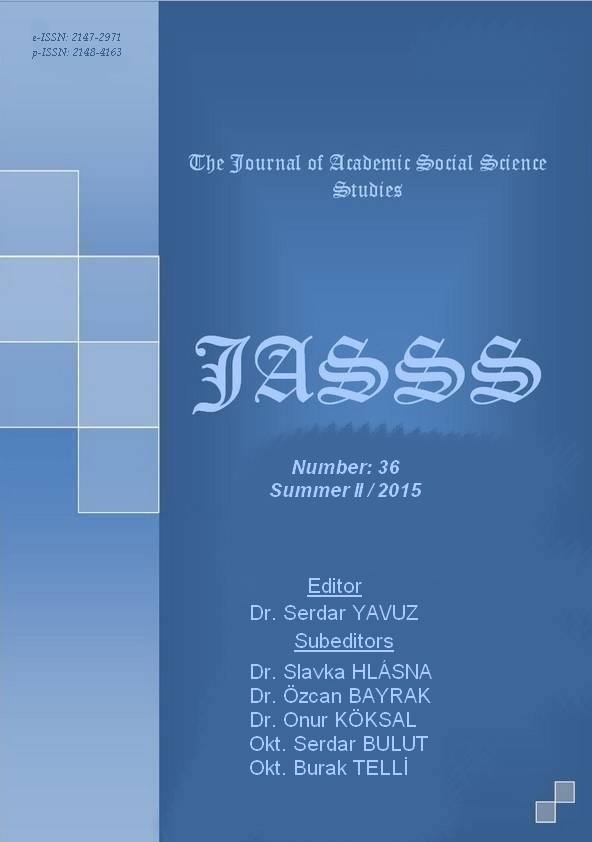Author :
Abstract
Kıbrıs, yüzyıllardan beri farklı kimliklerin ve kültürlerin iç içe geçtiği bir coğrafyadır. Kıbrıs Türk halkı da bu coğrafyada yaşayan en eski halklardan biridir. Ada, 1571’de başlayan Osmanlı İmparatorluğu egemenliği sonrası 1878 yılında İngiliz sömürge yönetimi ile idare edilmeye başlanmıştır. Sömürge yönetimi döneminde hem bu yönetimin hem de Rum halkı ile çatışmaların artması ile 1950’lerde Kıbrıs Türk halkının kimlik oluşum süreci hızlanmış ve ortaya koyduğu mücadele artmıştır. Siyasi ve toplumsal alanda yoğunlaşan bu mücadele döneminde edebiyat halkın en önemli kimlik oluşturma ve devam ettirme kanallarından biri olmuştur. Bu süreçte edebiyatçılar dinamik bir şekilde hem etkilemiş hem de etkilenmiştir. Ortaya koydukları eserlerde Kıbrıs Türk halkının içinde bulunduğu durum ve şartları zihin dünyalarında ortaya koymuşlardır. Kıbrıs Türk halkının edebiyat tarihi dönemsel olarak en yoğun 1950’lerde ortaya çıkmıştır. Eserleri ile bu süreçte yer almış Kıbrıslı Türk şair Süleyman Ali Uluçamğil, üzerinde durulması gereken önemli bir edebiyatçı olmuştur. Çalışmanın amacı Süleyman Ali Uluçamğil’in Kıbrıs’ta edebiyat alanında milli kimliğin inşasında önemini ortaya koymaktır. Genç yaşına rağmen ortaya koyduğu eserler ile adından bugüne kadar söz ettiren şair, Kıbrıs Türk halkının kimlik analizlerinde dinamik bir taşıyıcı olmuştur. Çalışmanın diğer amacı ise siyasi, kültürel ve toplumsal kimlik oluşum süreçlerinde edebiyatın ve diğer alanların da analiz edilmesi gerekliliğini vurgulamaktır. Çalışma betimsel ve analitik yöntemle yapılacaktır. Veriler ise süreç/ durum analizi ile ele alınacaktır.
Keywords
Abstract
The land of Cyprus features identities and cultures that have intermixed for centuries. Turkish Cypriots remain one of the oldest communities on the island. After the reign of the Ottoman Empire starting in 1571, the island was ceded to Britain and placed under colonial administration. Both the British rule and the growing conflicts with the Greeks accelerated the process of identity formation of Turkish Cypriots as well as their struggle during the colonial administration. Literature became one of the most crucial instruments for the people in forming and maintaining their identity during the period of struggle growing within political and social spheres. While poets and writers dynamically influenced the people during this time, they in turn were also influenced by the conditions of this period. In their works, they depicted the conditions and circumstances of Turkish Cypriots through their eyes. The most profound period of Turkish Cypriot literature emerged during the 1950s, wherein the Turkish Cypriot, Suleyman Ali Ulucamgil, a prominent poet of the time, deserves special attention for his major contributions. The purpose of this study is to highlight the significance of Suleyman Ali Ulucamgil, whose works strongly contributed to the formation of identity in Cyprus. Despite his young age, the poet’s dynamic voice became a subject of identity analysis of Turkish Cypriots with the works he produced. Another purpose of this study is to underline the necessity of analyzing literature as well as other fields for their roles in political, cultural and social identity formations. This study will be conducted using descriptive and analytical methods and the data will be interpreted through process/situation analysis.





